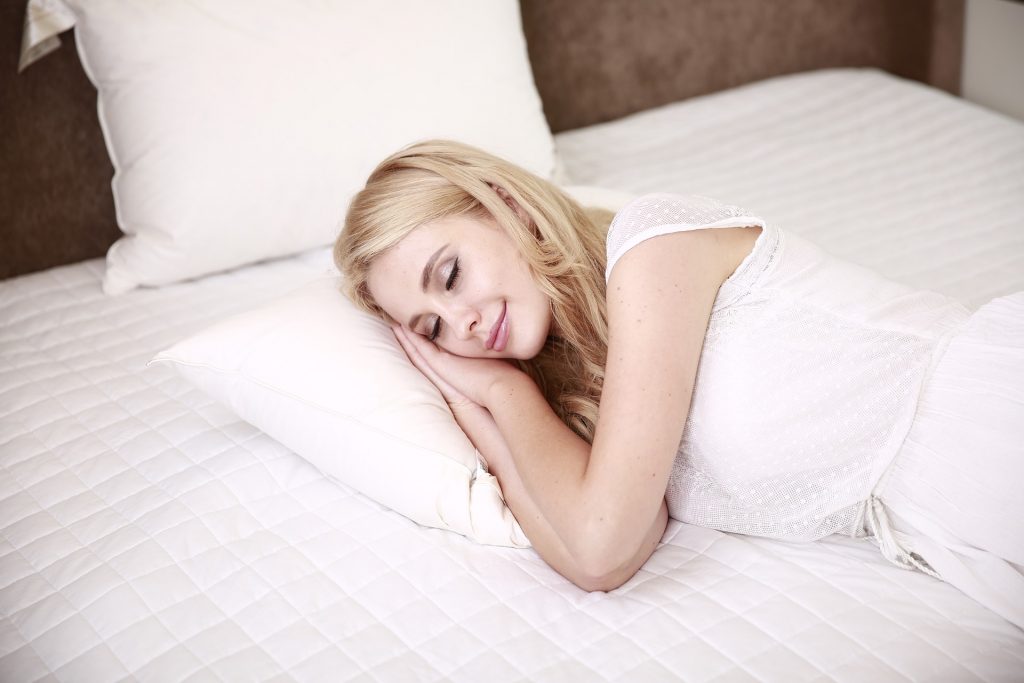17 proven tips for a better night's sleep
Good sleep is just as important as regular exercise and a healthy diet.
Research shows that poor sleep has immediate negative effects on your hormones, exercise performance and brain function.
It can also cause weight gain and increase the risk of disease in both adults and children.
In contrast, good sleep can help you eat less, exercise better, and be healthier.
Over the past few decades, both the quality and quantity of sleep have declined. In fact, many people regularly suffer from poor sleep.
If you want to optimize your health or lose weight, getting enough sleep is one of the most important things you can do.
Here are 17 evidence-based tips to help you sleep better at night
1. Increase the level of light during the day
Your body has a natural timekeeping clock known as your circadian rhythm. It affects your brain, body and hormones and helps you stay awake by telling your body when it's time to sleep.
Natural sunlight or bright light during the day helps keep your circadian rhythm healthy. This improves daytime energy as well as the quality and duration of nighttime sleep.
In people with insomnia, daytime exposure to bright light improves sleep quality and duration. It also reduces the time it takes to fall asleep with the 83%.
A study in adults found that 2 hours of exposure to bright light during the day increased the amount of good sleep by 2 hours and sleep efficiency with 80%.
2. Reduce the level of blue light in the evening
Exposure to light during the day is beneficial, but exposure to light at night has the opposite effect.
Again, this is due to its effect on your circadian rhythm, tricking your brain into thinking it's still daytime. This reduces hormones like melatonin that help you relax and get deep sleep.
Blue light – which electronic devices such as smartphones and computers emit in large quantities – is the worst in this regard.
There are several popular methods you can use to reduce your nighttime exposure to blue light. They include:
– Wear glasses that block blue light
– Download an app to block blue light on your laptop or computer.
– Install an app that blocks blue light on your smartphone. They are available for both iPhone and Android models.
– Stop watching TV and turn off bright lights 2 hours before heading to bed.
3. Don't consume caffeine late in the day
Caffeine has numerous benefits and is consumed by almost every adult
A single dose can improve focus, energy and athletic performance.
However, when consumed late in the day, caffeine stimulates your nervous system and can prevent your body from naturally relaxing at night.
In one study, caffeine consumption up to 6 hours before bed significantly worsened sleep quality.
Caffeine can stay elevated in your blood for 6-8 hours. Hence, drinking large amounts of coffee after 3–4 p.m. not recommended, especially if you are sensitive to caffeine or have trouble sleeping.
If you still crave Cup of coffee in the late afternoon or evening, stick to decaffeinated coffee.
4. Reduce irregular or long naps during the day
While short naps are beneficial, prolonged or irregular napping during the day can negatively affect your sleep.
Sleeping during the day can mess up your internal clock, meaning you may have trouble falling asleep at night.
While napping for 30 minutes or less can improve brain function during the day, longer naps can harm health and sleep quality.
However, some studies show that those who are used to sleeping regularly during the day do not experience poor sleep quality or disturbed sleep at night.
If you regularly nap during the day and sleep well, you should not worry. The effects of naps vary from person to person.
5. Try to sleep and wake up at a consistent time
Your body's circadian rhythm functions in a certain cycle, aligning with sunrise and sunset.
Consistency with sleep and wake times can help with long-term sleep quality.
If you struggle with sleep, try to get into the habit of waking up and going to bed at similar times. After a few weeks, you may not even need an alarm.

6. Consider supplements
Several supplements can induce relaxation and help you sleep, including:
Ginkgo biloba: A natural herb with many benefits, it can aid sleep, relaxation and stress reduction. Take 250 mg 30–60 minutes before bedtime.
Glycine: Various studies have shown that taking 3 grams of the amino acid glycine can improve sleep quality.
Valerian root: Studies show that valerian can help you fall asleep and improve the quality of your sleep. Take 500 mg at bedtime
Magnesium: Responsible for over 600 reactions in your body, magnesium can improve relaxation and improve sleep quality.
L-theanine: An amino acid, L-theanine can improve relaxation and sleep. Take 100–200 mg at bedtime.
Lavender: A powerful herb with many health benefits, lavender can induce a calming and sedative effect to improve sleep. Take 80–160 mg containing 25–46% linalool.
Be sure to try these supplements only one at a time.
7. Do not drink alcohol
A few drinks at night can negatively affect sleep and hormones.
Alcohol is known to cause or increase the symptoms of sleep apnea, snoring, and disturbed sleep patterns. It also changes the production of melatonin at night, which plays a key role in your body's circadian rhythm.
8. Optimize your bedroom environment
Many people believe that the bedroom environment and its setting are key factors for a good night's sleep.
These factors include temperature, noise, outside lights and furniture arrangement.
Numerous studies indicate that outdoor noise, often from traffic, can cause poor sleep and long-term health problems.
To optimize your bedroom environment, try to minimize external noise, light and artificial lighting from devices such as alarm clocks. Make sure your bedroom is a quiet, relaxing, clean and pleasant place.
9. Adjust the temperature in your bedroom
Body and bedroom temperature can also greatly affect sleep quality.
As you may have experienced in the summer or in hot places, it can be very difficult to get a good night's sleep when it's too hot.
In fact, bedroom temperature affects sleep quality more than outside noise.
Around 20°C seems to be a comfortable temperature for most people, although it depends on your preferences and habits.
10. Don't eat late at night
Eating late at night can negatively affect both sleep quality and the natural release of HGH and melatonin.
However, the quality and type of your snack can also play a role.
A high-carbohydrate meal eaten 4 hours before bed helps people fall asleep faster.
Interestingly, one study found that a low-carb diet also improved sleep, indicating that carbs aren't always necessary, especially if you're used to a low-carb diet.
11. Relax and clear your mind in the evening
Many people have a bedtime routine that helps them relax.
Bedtime relaxation techniques have been shown to improve sleep quality and are another common technique used to treat insomnia.
Strategies include listening to relaxing music, reading a book, taking a hot bath, deep breathing, visualization, and meditation. We recommend the meditation: Cure insomnia: Techniques for peaceful and restorative sleep by Milena Goleva. You can find meditation HERE.
Try different methods and find what works best for you.
12. Take a relaxing bath or shower
A relaxing bath or shower is another popular way to sleep better.
Studies show that they can help improve overall sleep quality and help people – especially older people – sleep more soundly.
In one study, taking a hot bath 90 minutes before bed was shown to improve sleep quality and help people get deeper sleep.
Alternatively, if you don't want to shower at night, just soak your feet in hot water. It can also help you relax and improve sleep.
13. Rule out sleep problems
An underlying health condition may be the cause of your sleep problems.
One common problem is sleep apnea, which causes inconsistent and interrupted breathing. People with this disorder stop breathing repeatedly while they sleep.
This condition may be more common than you think. 24% of males and 9% of females had sleep apnea.
Other common medically diagnosed problems include sleep movement disorders and circadian sleep/wake disorders, which are common in shift workers.
If you've always struggled with sleep, it might be wise to check with your doctor.
14. Get a comfortable bed, mattress and pillow
Some people wonder why they always sleep better in a hotel.
In addition to the relaxing environment, the quality of the bed can also affect sleep.
One study looked at the benefits of the new mattress over 28 days, revealing that it reduced back pain with the 57%, shoulder pain with the 60% and back stiffness with the 59%. It also improves sleep quality with the 60%.
Other research indicates that new bedding can also improve sleep. In addition, poor-quality bedding can lead to increased pain in the lower back.
The best mattress and bedding is extremely subjective. If you're upgrading your bedding, base your choice on personal preference.
15. Do light yoga before bed
Yoga is one of the best science-backed ways to improve your sleep and health.
It can improve all aspects of sleep and is used to reduce symptoms of insomnia.
Start now a holy yoga program with Milena Goleva
16. Do not drink liquids before going to bed
Nocturia is the medical term for excessive urination at night. It affects sleep quality and daytime energy
Drinking large amounts of fluids before bed can lead to similar symptoms, although some people are more sensitive than others.
Although hydration is vital to your health, it's wise to reduce your fluid intake late in the evening.
Try not to drink liquids 1-2 hours before bed.
You should also use the toilet immediately before going to bed, as this can reduce your chances of waking up during the night.
17. Bonus tip
We present to you a very useful video by Milena Goleva with precise steps for healthy and restful sleep:






Facebook Comments